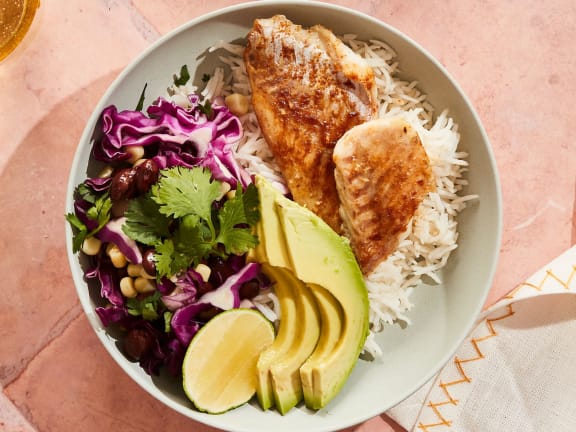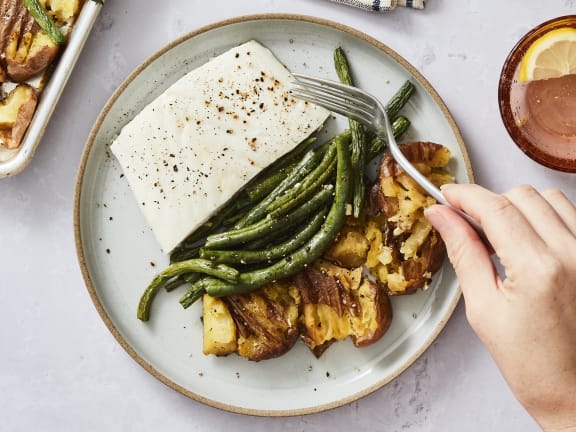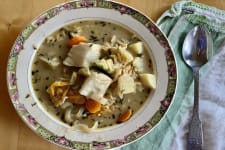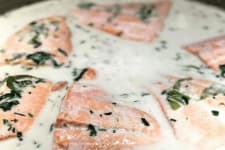Combining wild-caught fish and vegetables is a nourishing way to put together a delicious, easy meal. No matter your skill level as a home cook, it’s a combination that has limitless possibilities throughout the year.
While almost any veggie can be paired with seafood — and should be, since both food groups are lacking in the American diet — there are certain combinations that best complement the qualities of different species of fish. Even more, some powerful duos work together to potentially enhance the nutrition of both the vegetable and the fish.
Best Fish and Vegetable Pairings
Sockeye Salmon and Spinach

Sockeye salmon, known for its robust flavor and omega-3 fatty acid content, pairs perfectly with any variety of spinach. Spinach contains vitamins A and K, both fat soluble vitamins, which means that dietary fat (like the omega-3s available in sockeye salmon) enhance their absorption. Vitamin A plays key roles in immune and vision health, while vitamin K helps with proper blood clotting. It’s also a delicious combination, since spinach has a strong flavor that stands up well to this species of salmon.
Try topping a fresh spinach salad with grilled salmon fillets or serve garlic sauteed spinach with a pan seared portion.
This easy recipe for Sheet Pan Salmon pairs the fish with wilted spinach and maple-roasted sweet potatoes. If you have Ground Sockeye Salmon in your freezer, use it as a filling for Spinach Feta Pie.
Sweet Corn and Pacific Cod

Corn has a reputation for not being the “healthiest” veggie, but on the contrary, this nutritious vegetable provides B vitamins that are essential for energy and metabolism, and insoluble fiber, which promotes digestive health. When paired with Pacific cod, corn’s mild, starchy flavor brings out the mild sweetness of this flaky white fish. The carbohydrate content in corn also complements Pacific cod’s lean protein for a perfectly balanced meal.
Serve up fresh ears of corn with quick cooking Pacific cod for a light summer meal, or saute kernels with butter and fresh herbs for a more decadent dish. Can’t find fresh corn? Canned or frozen (without added salt or sugars) are just as nutritious.
Pacific cod would be a great addition to this Miso Corn Chowder. Or, try searing a fillet of Pacific cod to serve with a Fennel and Corn Relish.
Rockfish and Bell Peppers

Lean rockfish has a more robust flavor compared to other white fish, so it pairs well with bright and flavorful bell peppers. Bell peppers of all colors pack a vitamin C punch, but red and orange varieties have the most — almost triple your daily value! Known for its key role in our immune systems, vitamin C also supports collagen and blood vessel structure. And since vitamin C is water soluble, it doesn’t rely on fat for maximum absorption, perfect for a lean fish pairing like rockfish.
Try serving grilled and seasoned rockfish with spiced fajita peppers for a tasty, nutritious and colorful fish taco.
Take one of our favorite rockfish recipes and add sauteed peppers and onions as a side dish. A Cumin-Chili Marinade would add appetizing spice to rockfish, grilled fajita-style.
Pacific Halibut and Baby Potatoes

Pacific halibut’s meaty, firm texture stands up well to a steakhouse classic: creamy and slightly sweet baby potatoes. Potatoes provide gut-friendly fiber, heart-healthy potassium and immune supporting vitamin C. Plus since baby potatoes have a thinner skin, you can leave it on when eating for a bigger fiber boost.
Smaller potatoes will take less time to cook than a whole baked potato, but still take longer to cook than the fish — keep that in mind when timing your meals. If roasting, give the potatoes a head start and add the fish to the pan when the potatoes are close to being done. Finish with a squeeze of lemon for even more vitamin C.
Leave the skins on when making the golden potato topping for this Pacific Halibut Pie. Or try making a sheet pan meal of Pacific Halibut with Crispy Smashed Potatoes and Garlicky Green Beans.
About Jenna Amos, RDN:
Jenna Amos is a Registered Dietitian Nutritionist and nutrition communications expert. She has nearly 10 of experience contributing to and leading well-being strategies for brands across the food industry, from start ups to category leaders. Jenna has an “all foods fit” approach to nutrition, with a focus on local and sustainable foods. She is passionate about the future of our food system, nutrition policy and sustainable agriculture.
Jenna received her degree in dietetics from Boston University and completed her Dietetic Internship at VCU Health in Richmond, VA. In her free time, she enjoys urban gardening, developing recipes and hiking her way through the National Parks.





